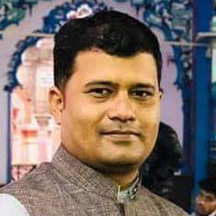Politics
Yadav’s early-morning swearing-in as Madhesh chief minister sparks controversy
Province Head Bhandari left Janakpur early morning, citing illness and administered an oath to Yadav at a Bardibas hotel.
Ajit Tiwari, Santosh Singh & Sunita Baral
Madhesh Province Head Sumitra Subedi Bhandari left Janakpur at 4am on Monday, citing health reasons, and travelled towards Kathmandu.
She was seen off by caretaker Chief Minister Jitendra Sonal, who wished her a speedy recovery.
However, Bhandari later reached Panas Cottage in Bardibas, where she appointed CPN-UML parliamentary party leader Saroj Kumar Yadav as the new chief minister under Article 168(3) of the constitution.
Seven parties, including the Nepali Congress, had been pressuring her to call for government formation under Article 168(2), while the UML had demanded that the government be formed under Article 168(3), staging protests at the province head’s office in Janakpur.
At 5:20am, Yadav took the oath of office at the hotel. UML lawmaker Lakhan Das Tatma, Nepal Sanghiya Samajbadi Party’s Bimala Ansari, and Rastriya Prajatantra Party’s Kanchan Bichchha were also sworn in as ministers without portfolio.
On Sunday evening, Bhandari had met with lawmakers from the Congress, Maoist Centre, Loktantrik Samajbadi Party, CPN (Unified Socialist), Janamat Party, and Janata Samajbadi Party, assuring them that she would decide only after further consultation. But, she left the province head’s official residence in Janakpur early Monday, saying she was travelling to Kathmandu for treatment.
Her sudden travel to Bardibas to appoint Yadav as chief minister has drawn widespread criticism, with many accusing her of using illness as a pretext to bypass the due constitutional process.
The Madhesh Province government led by Chief Minister Jitendra Prasad Sonal collapsed on Saturday, just 25 days after its formation, after he failed to secure a vote of confidence in the provincial assembly.
Sonal, who had formed the government on October 15 with the support of 56 lawmakers under Article 168(2) of the constitution, resigned hours before the scheduled trust vote when it became clear that all his coalition partners would not back him.
Two CPN (Maoist Centre) lawmakers—Rahbar Ansari and Mala Karn—publicly announced that they would neither vote for nor against the motion, effectively abstaining from the confidence vote.
Similarly, former chief minister Satish Kumar Singh and lawmaker Tribhuwan Sah, who had earlier supported Sonal, announced to remain absent from the assembly session. The suspension of Janata Samajbadi Party lawmaker Saroj Singh Kushwaha further weakened Sonal’s position.
The chief minister needed 53 votes to prove the majority.
Article 168(2) states that in cases where no party has a clear majority in a provincial assembly, the province head shall appoint as the chief minister a member of the assembly who can command a majority with the support of two or more parties representing the assembly.
Likewise, Article 168(3) stipulates that in cases where the chief minister cannot be appointed under clause (2), the province head shall appoint the parliamentary party leader of the party which has the highest number of members in the assembly as the chief minister.
The chief minister appointed under clause (2) or (3) must obtain a vote of confidence from the assembly no later than 30 days after the date of such appointment.
The UML, which is the largest party in the assembly, insisted on appointing the chief minister as per Article 168(3) while other parties asked the Province Head Bhandari to make a call for political parties to form a coalition government under Article 168(2) first before jumping to the 168(3).




 13.16°C Kathmandu
13.16°C Kathmandu
















